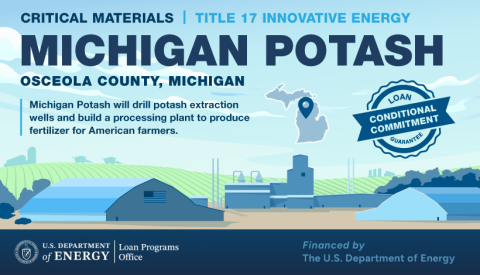Michigan Potash will drill potash extraction wells and build a processing plant to produce fertilizer for American farmers.
Office of Energy Dominance Financing
January 17, 2025The U.S. Department of Energy’s Loan Programs Office (LPO) announced today a conditional commitment for a loan guarantee of up to $1.26 billion ($1.12 billion in principal and $141 million in capitalized interest) to Michigan Potash Company, LLC (Michigan Potash). The loan guarantee will help finance the construction of a potash solution mine and processing plant in Osceola County, Michigan, to produce approximately 800,000 tons per year of fertilizer-grade muriate of potash and about 1 million tons per year of salt. The project is expected to create, at its peak, 1,400 full-time equivalent union construction jobs and 200 ongoing operations jobs.
Potash is one of the key natural fertilizers needed for agricultural production, and the United States currently imports over 90% of its annual demand, mostly from Canada. This project will play a critical role in securing domestic fertilizer supply for the Corn Belt region, contributing to both food security and supply chain resilience. The project’s location in Michigan provides advantageous proximity to the Corn Belt.
The Michigan Potash project plans to electrify thermal processes and utilize emission-free electricity sources for the majority of its electricity demand. If finalized, the Michigan Potash plant would be one of the only new potash facilities built domestically within the last 60 years and would be the most energy-efficient plant with limited surface disturbance due to its innovative pairing of intrinsic geothermal heat from solution mining and mechanical vapor recompression (MVR).
The brine extracted from an underground deposit is processed into high-grade muriate of potash (MOP) and multiple grades of salt via crystallization. The MOP will be sold to ADM while salt will be sold to a range of markets including food-grade, bulk, water conditioning, and road de-icing.
LPO borrowers are required to develop and ultimately implement a comprehensive Community Benefits Plan (CBP). CBPs ensure borrowers meaningfully engage with community and labor stakeholders to create good-paying jobs and improve the well-being of the local community and workers.
Michigan Potash has committed to a project labor agreement with 11 trade unions and will have a majority union construction workforce. The company has also opened a community center near the project site for residents to voice concerns, ask questions, or hold meetings about the project.
Michigan Potash has partnered with educational institutions to better engage the community and foster a diverse and talented hiring pool. The company has forged relationships with Western Michigan University, Michigan Tech, Ferris State University, Michigan State University, and Central Michigan University.
The loan guarantee is offered through LPO’s Title 17 Clean Energy Financing Program, which includes financing opportunities for innovative energy and supply chain projects and projects that reinvest in existing energy infrastructure. Michigan Potash’s project is innovative in its electrification of thermal processes coupled with the utilization of intrinsic geothermal heat and mechanical vapor recompression to reduce processing energy demand.
While this conditional commitment indicates DOE’s intent to provide a loan guarantee to finance the project, DOE and the company must satisfy certain technical, legal, environmental, and financial conditions before the Department enters into definitive financing documents and funds the loan guarantee.


